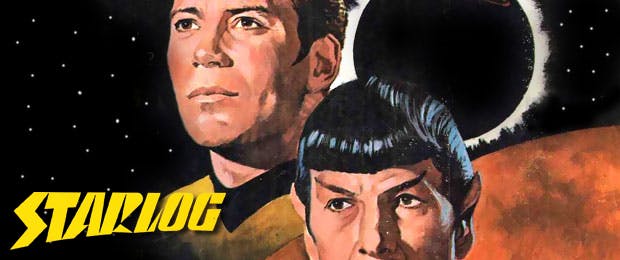
Here's what's to blame for the abundance of Star Trek articles in Starlog beginning in late 1985: Tiger Beat. Also, its longtime competitor, 16 Magazine. And, well, me. But I got the notion from Tiger Beat and 16.
After I took over as Starlog's Editor in April 1985, I faced an ongoing challenge. Two large subsets of our readership were underserved, Star Wars fans and Trekkers. Beside Ewok TV movies and animated fare (Droids, Ewoks), there just wasn't enough new Star Wars stuff to cover (as fans endured "The Long Wait" for another flick, fulfilled 14 years later). With Star Trek, we were in a similar boat (or, more aptly, starship) but at least we could expect a new Trek film about every two years. But what to do in the meantime?
That's where Tiger Beat and 16 came in. Those top-selling teen magazines catered to their readership with what fans wanted every issue, more (stories & photos) on the same (people). So, whatever "teen idols" happened to be most popular that era---be it The Monkees, David Cassidy, Joannie & Chachi, Menudo, Backstreet Boys, Justin Bieber---would be showcased in each issue and on most every multi-image cover. You can even chart the inevitable rise and fall of such celebs by studying just how prominently they appear on consecutive covers (sometimes with photo heads surrealistically attached to cartoon bodies; more important idols got bigger heads). Big heads for James T. Kirk and Darth Vader weren't the way for Starlog to go, but...
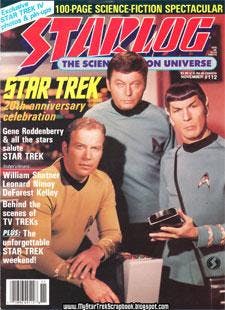
We did start interviewing less-visible Star Wars people like Denis (Wedge) Lawson and Sebastian Shaw (the Old Anakin originally waving at Return of the Jedi's end). With Trek, there were always (more) possibilities: 79 episodes of The Original Series, 22 Animated Treks. We had previously talked to creator Gene Roddenberry and writer-producer Fred Freiberger; David Gerrold, author of "The Trouble with Tribbles," was a monthly presence in Starlog as a columnist. But, why not pursue all of Trek's other writers and talk to everyone willing and able to chat? And the episode directors as well?
As for the actors, Canadian freelancers Mark Phillips and Frank Garcia soon sent me an unsolicited manuscript entitled "The Guests of Trek," featuring some actor mini-interviews. Phillips and Garcia also proposed that, if I liked their story, they could do more just like it. Why not? I ran their debut entry in issue #112 in 1986. Now, Starlog would also try to profile every actor possible -- some in brief pieces under that "Guests of Trek" umbrella title (expanded to employ any contributor); others in full-length articles since there was far more besides Trek to discuss with guest stars like Sally Kellerman ("Where No Man Has Gone Before," Starlog #154), Harry Townes ("The Return of the Archons," #168), Lee Meriwether ("That Which Survives," #153) and John Fiedler ("Wolf in the Fold," Starlog Yearbook #16). (All issues cited throughout are Starlog, unless otherwise noted. All 79 TOS episodes are represented here somewhere.)
This was a systematic effort we were launching, ultimately involving dozens of contributors, thousands of man-hours and tens of thousands of dollars (to pay for it all). My Managing Editors and I prepared elaborate assignment sheets for each potential interview with suggested questions and topics (so no one could forget to also ask about such other important credits as The Twilight Zone, The Outer Limits and Batman). We also worked to acquire relevant photos (a real limitation to publishing some pieces), even buying at SF cons specific film frames (cut out of discarded 16mm Trek episode prints and then mounted as slides, which we could reproduce from in the magazine).
We were bedeviled by such intermittent difficulties as writers' pseudonyms (Lee Cronin, John Kingsbridge), interview turndowns (from Vic Tayback, writer Jeremy Tarcher, etc.) and people we just couldn't find (like Sandra Smith of "Turnabout Intruder," Glenn Corbett of "Metamorphosis"). Memory also played a part. Some of these people only toiled in Trekburgh for a few days acting in a six- or seven-day episode shoot or perhaps two to three weeks prepping/directing that show or several weeks writing its script. Thus, to many of them, Star Trek was just another brief gig decades ago in a busy career, and they didn't necessarily have lotsa anecdotes to share. Of course, we asked them anyhow.
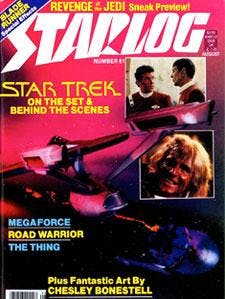
We landed some unusual SF people: celebrated attorney/non-actor Melvin Belli (the Gorgan in "And the Children Shall Lead," #121), impressionist-actor Frank Gorshin (Batman's Riddler, white-on-black or vice versa in "Let That Be Your Last Battlefield," the Starlog Presents Batman & Other Comics Heroes one-shot), puppeteer Shari Lewis (who co-wrote "The Lights of Zetar," #172) and song-and-dance man Gene Nelson (famed for his stellar turn as Will Parker in the movie musical Oklahoma!; he directed "The Gamesters of Triskelion," #180).
Among the other directors we talked to were the prolific Marc Daniels ("The Man Trap," "The Naked Time," "Space Seed," "The Changeling," "A Private Little War," "Spock's Brain" and nine others, #114), Joseph Pevney ("Arena," "The City on the Edge of Forever," "Amok Time," "The Apple," "The Trouble with Tribbles," "The Immunity Syndrome" and eight more, #126), Ralph Senensky ("Metamorphosis," "Obsession," "Bread and Circuses" and three others, #172), Leo Penn ("The Enemy Within," also father of actor Sean Penn, #179) and John Newland (host and creative force behind TV's One Step Beyond anthology of "true" paranormal tales, "Errand of Mercy," #130). And, yes, we chatted with both Trek pilot directors: Robert Butler (the first attempt, "The Cage," #117) and James Goldstone (the second, which sold the series, "Where No Man Has Gone Before," #124).
Multiple episode Trek writers we profiled included the ultra-important D.C. Fontana ("Charlie X," "Tomorrow Is Yesterday," "The Ultimate Computer," "The Way to Eden," plus six others, some credited as Michael Richards; also TOS story editor, #118), John Meredyth Lucas ("The Changeling," "Patterns of Force," "Elaan of Troyius," "That Which Survives;" also the director of "The Ultimate Computer" and "The Enterprise Incident," #112), Jerome Bixby ("Mirror, Mirror," "By Any Other Name," "The Day of the Dove," "Requiem for Methulaseh," #164), Jerry Sohl ("The Corbomite Maneuver," credited as Nathan Butler on "This Side of Paradise," "Whom Gods Destroy," #135-6), Margaret Armen ("The Gamesters of Triskelion," "The Paradise Syndrome," "The Cloud Minders," #125), Arthur Heinemann ("Wink of an Eye," "The Way to Eden," "The Savage Curtain," #147), Shimon Wincelberg a.k.a. S. Bar David ("Dagger of the Mind," "The Galileo Seven," #159), David P. Harmon ("The Deadly Years," "A Piece of the Action," #117), Stephen W. Carabatsos ("Court Martial," "Operation: Annihilate," #168) and Paul Schneider ("Balance of Terror," "The Squire of Gothos," Starlog Spectacular #3).
One-shot scribes also interviewed were Norman Spinrad ("The Doomsday Machine," #129), Judy Burns ("The Tholian Web," #165), Joyce Muskat ("The Empath," Starlog Platinum Edition #1), Adrian Spies ("Miri," #130) and George F. Slavin ("The Mark of Gideon," #171).
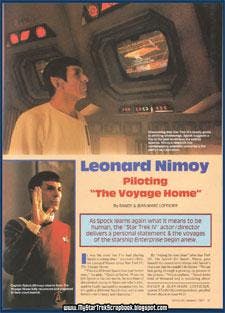
And we didn't neglect important guest actresses. That lineup includes Jane Wyatt (Spock's Mom, "Journey to Babel," Star Trek IV, #161), Diana Muldaur ("Return to Tomorrow," "Is There in Truth No Beauty?," #141), Barbara Babcock ("Plato's Stepchildren," #220), Joanne Linville ("The Enterprise Incident," #306), Julie Newmar ("Friday's Child," #148), Arlene Martel ("Amok Time," #291) and Kate Woodville ("For the World is Hollow and I Have Touched the Sky," #132). And Orion slave girls? Take your pick: Susan Oliver ("The Menagerie," #135) and Yvonne Craig (in one simultaneous two-magazine interview focusing on "Whom Gods Destroy" in Starlog #149 and on her Batgirl heroics in Comics Scene #10).
Occasionally, when fresh projects arose, their savvy publicists presented incredibly easy opportunities for Starlog to chat with, for example, Mariette Hartley (about Encino Man but also "All Our Yesterdays," #180), Keye Luke (concerning Dead Heat as well as his role as Charlie Chan's #1 Son and "Whom Gods Destroy," #130) and director Joseph Sargent (to ballyhoo Jaws IV: The Revenge and detail "The Corbomite Maneuver," #121).
We even dug up 16 Magazine-like cartoon bodies for a mini-interview round-up by "Guests of Trek" co-originator Phillips of multiple actors-stuntmen-extras who had portrayed Trek's doomed "red-shirts" -- Security personnel who beamed down to perilous planets but rarely beamed back breathing. With such photos scarce, Starlog cartoonist Tom Holtkamp instead creatively caricatured their final fates in "They're Dead, Jim!" (#283).
Literally, we were racing mortality -- as one might expect with a TV series
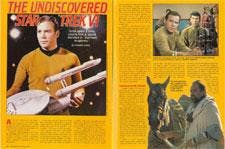
Starlog writer Edward Gross arranged to quiz veteran director Gerd Oswald (who helmed "The Conscience of the King" and "The Alternative Factor" plus a dozen Outer Limits classics including "Soldier"). Gross called on the agreed day, but Oswald soon cut the conversation short (with the promise to continue at a later date), citing a medical appointment that afternoon. Oswald then entered a hospital and, I was told, never left (dying in 1989). That kind of tragic development lends greater urgency to the pragmatic desire just to get people on tape.
In some cases, interviews went ahead nonetheless. For example, I reprinted from zines with smaller circulations Joel Eisner's talk with the late Ted Cassidy ("What Are Little Girls Made Of?," #115) and Dan Madsen's Q&A with Harcourt Fenton Mudd himself, the late Roger C. Carmel ("Mudd's Women," "I, Mudd," #127). This, strangely, led to a new brand of Starlog feature wherein I ran previously unpublished, "posthumous interviews" with the non-Trek likes of SF icon Philip K. Dick, Jimmy Stewart, legendary animator Chuck Jones and Rod Serling. And, I must sadly note now, it's fortunate that we interviewed all those Star Trek people when we did; perhaps half of them have since died.
Besides Phillips, Garcia, Drennan and Gross, many of Starlog's writers contributed these type of Trek profiles over the years; among them, Lee Goldberg, Bill Florence, Pat Jankiewicz, Craig Chrissinger, Kyle Counts, Bill Warren, Tom Weaver, Randy & Jean-Marc Lofficier, Bob Greenberger, Peter Bloch-Hansen, Eric Niderost, Joe Nazzaro and Ian Spelling. Thanks to them all.
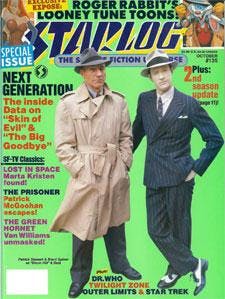
When we began this crusade (dubbed, in tribute to The Blues Brothers, "a mission from God"), I knew it would take years, but I had no idea that Paramount would shortly, in Nimoy's words, "try to catch lightning in a bottle" again with The Next Generation and three subsequent new TV series. These shows multiplied the number of interview candidates---actors (regulars plus guests), writers, directors, producers and others---exponentially. We also tried to interview as many of them as possible in Starlog and our Official Magazines dedicated to The Next Generation, DS9 and Voyager. It was, I have to say, a never-ending effort.
Fanzines, Titan's licensed publications, other genre periodicals, reference books, autobiographies and websites -- including StarTrek.com, of course -- have all added to this massive mountain range of Star Trek saga interview material. Maybe as many as 75% of all the major workers in our favorite universe have thus talked Trek sometime to somebody.
It's an endless quest for pop culture journalists, one that will no doubt continue on tomorrow and tomorrow and tomorrow.
David McDonnell, "the maitre’d of the science fiction universe," has dished up coverage of pop culture for more than three decades. Beginning his professional career in 1975 with the weekly "Media Report" news column in The Comic Buyers’ Guide, he joined Jim Steranko’s Mediascene Prevue in 1980. After 31 months as Starlog’s Managing Editor (beginning in October 1982), he became that pioneering SF magazine’s longtime Editor (1985-2009). He also served as Editor of its sister publications Comics Scene, FangoriaandFantasy Worlds. At the same time, he edited numerous licensed movie one-shots (Star Trek and James Bond films, Aliens, Willow, etc.) and three ongoing official magazine series devoted to Trek TV sagas (The Next Generation, Deep Space Nine, Voyager). He apparently still holds this galaxy’s record for editing more magazine pieces about Star Trek in total than any other individual, human or alien.Copyright 2014 David McDonnell
